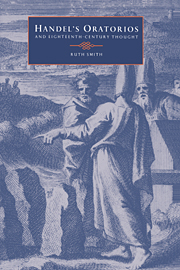Book contents
- Front Matter
- Contents
- Acknowledgements
- Abbreviations
- Introduction
- PART 1 ENGLISH ORIGINS OF ENGLISH ORATORIO
- Chapter 1 Artistic norms
- Chapter 2 The purpose of art
- Chapter 3 Music, morals and religion
- Chapter 4 The biblical sublime
- Chapter 5 The survival of epic
- Chapter 6 The defence of Christianity
- Chapter 7 Towards oratorio
- PART II THE PATRIOT LIBRETTO FROM THE EXCISE BILL TO THE JEW BILL: ISRAELITE ORATORIOS AND ENGLISH POLITICS
- Appendix I Libretto authors and sources
- Appendix 2 The oratorios and Methodism
- Notes
- Bibliography of sources cited
- Index
Chapter 1 - Artistic norms
Published online by Cambridge University Press: 22 September 2009
- Front Matter
- Contents
- Acknowledgements
- Abbreviations
- Introduction
- PART 1 ENGLISH ORIGINS OF ENGLISH ORATORIO
- Chapter 1 Artistic norms
- Chapter 2 The purpose of art
- Chapter 3 Music, morals and religion
- Chapter 4 The biblical sublime
- Chapter 5 The survival of epic
- Chapter 6 The defence of Christianity
- Chapter 7 Towards oratorio
- PART II THE PATRIOT LIBRETTO FROM THE EXCISE BILL TO THE JEW BILL: ISRAELITE ORATORIOS AND ENGLISH POLITICS
- Appendix I Libretto authors and sources
- Appendix 2 The oratorios and Methodism
- Notes
- Bibliography of sources cited
- Index
Summary
When the English public was introduced to Esther in 1732 it also encountered the designation oratorio for the first time. The advertisements for both the ‘pirated’ York Buildings version and Handel's own performances referred to the work as such. The former helpfully added ‘or Sacred Drama’, but this may have raised false expectations. The commentator who objected to Handel's Italian singers mangling the English words, though carefully warned in Handel's advertisement that ‘There will be no Action on the Stage’, complained that ‘I saw indeed the finest Assembly of People I ever beheld in my Life, but, to my great Surprize, found this Sacred Drama a mere Consort [concert], no Scenary, Dress or Action, so necessary to a Drama’. Preferring Handel's new operas, Ezio and Sosarme, he confesses:
(I am sorry I am so wicked) but I like one good Opera better than Twenty Oratorio's: Were they indeed to make a regular Drama of a good Scripture Story, and perform'd it with proper Decorations, which may be done with as much Reverence in proper Habits, as in their own common Apparel; (I am sure with more Grandeur and Solemnity, and at least equal Decency) then should I change my Mind, then would the Stage appear in its full Lustre, and Musick Answer to its original Design.
- Type
- Chapter
- Information
- Handel's Oratorios and Eighteenth-Century Thought , pp. 43 - 51Publisher: Cambridge University PressPrint publication year: 1995



